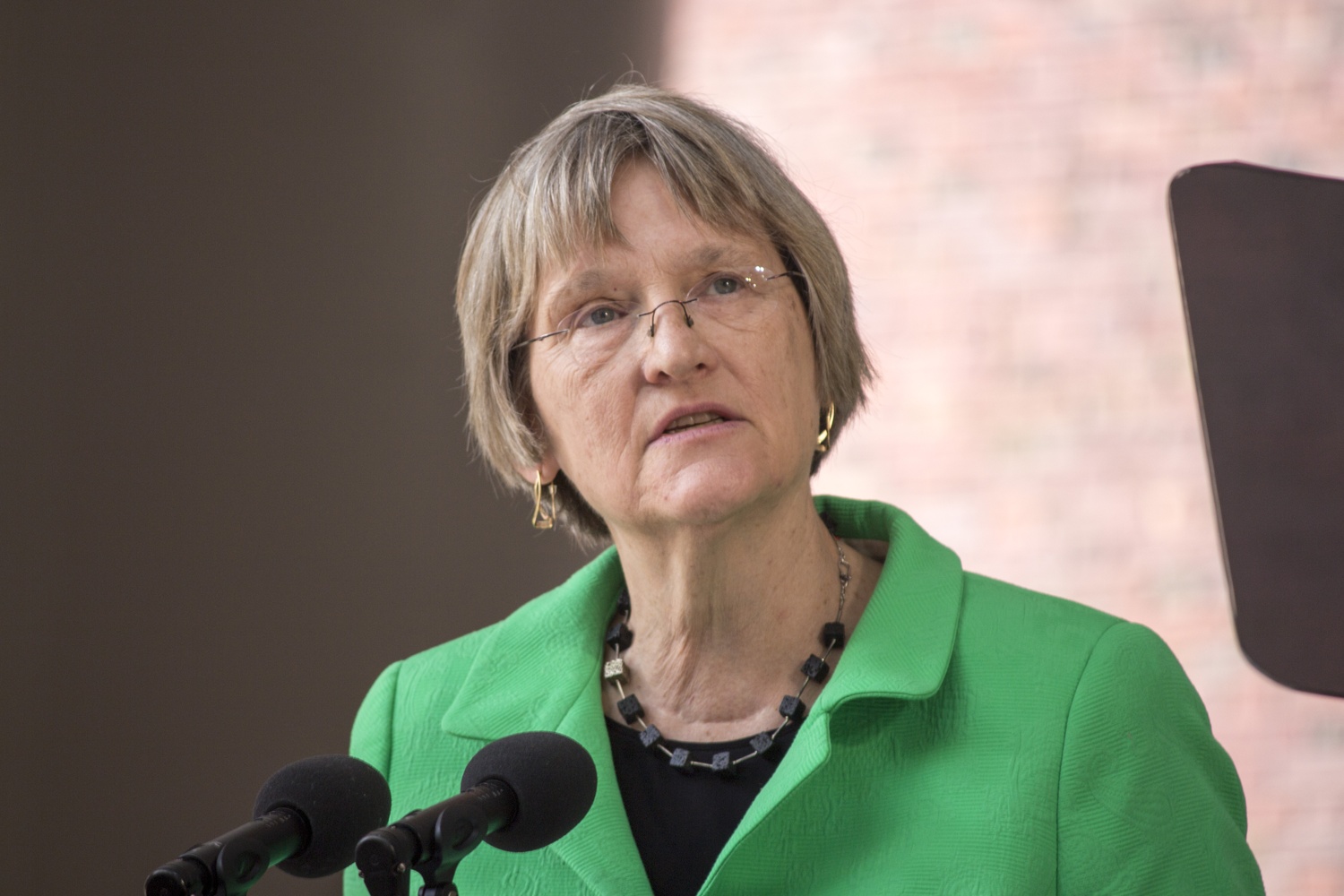
News
Cambridge Residents Slam Council Proposal to Delay Bike Lane Construction

News
‘Gender-Affirming Slay Fest’: Harvard College QSA Hosts Annual Queer Prom

News
‘Not Being Nerds’: Harvard Students Dance to Tinashe at Yardfest

News
Wrongful Death Trial Against CAMHS Employee Over 2015 Student Suicide To Begin Tuesday

News
Cornel West, Harvard Affiliates Call for University to Divest from ‘Israeli Apartheid’ at Rally
Faust, Administrators Criticize Immigration Order

UPDATED: January 30, 2017 at 10:46 a.m.
University President Drew G. Faust called on “the administration, the Congress, and the courts” to reconsider an executive order blocking immigrants from seven predominantly Muslim countries from entering the United States in a sharp defense of the University’s “vital interests” Sunday.
Administrators across the University—including the deans of the College, Law School, Business School, and Medical School—also criticized the order in emails to their respective schools.
In her email sent to the University, Faust outlined a number of resources Harvard will provide to affiliates affected by the order, which prevents immigrants from Iraq, Iran, Libya, Somalia, Sudan, Syria, and Yemen from entering the United States for 90 days. The order, signed by President Donald Trump Friday, also bars all refugees for 120 days and Syrian refugees indefinitely.
At least two Harvard affiliates have been blocked from entering the United States since the order took effect. Faust directed affiliates to a statement released by the Harvard International Office Saturday advising foreign nationals not to leave the country.
Harvard will hold a town hall meeting Wednesday in Science Center B to discuss the implications of the immigration order for international affiliates.
In her message Sunday, Faust reiterated the University’s support for its undocumented students, writing that Harvard Law School’s Immigration and Refugee Clinic had hired a full-time attorney dedicated to representing undocumented students and launched a website providing resources for those students. She pledged to continue lobbying members of Congress to pass the BRIDGE Act, which would provide protections for undocumented students.
Faust also asserted the importance of the University’s global reach and affirmed Harvard’s commitment to its international affiliates and programs.
“Nearly half of the deans of Harvard’s schools are immigrants—from India, China, Northern Ireland, Jamaica, and Iran,” Faust wrote. “Benefiting from the talents and energy, the knowledge and ideas of people from nations around the globe is not just a vital interest of the University; it long has been, and it fully remains, a vital interest of our nation.”
Faust wrote she will lobby lawmakers to reverse restrictions imposed by the order.
“Amid this widespread doubt and unease, we will continue to insist that policymakers take full account of how fundamentally our universities depend on the ability of people to travel across borders without undue constraint,” she wrote.
In her email, Faust noted the concerns of Muslim Harvard affiliates in particular and emphasized the importance of religious tolerance.
“Ours is a nation founded and built on the bedrock of religious pluralism and religious freedom,” she wrote. “Our University embraces that commitment, in the spirit not of mere tolerance but of genuine inclusion. We must not and will not conflate people of a venerable faith with people predisposed to acts of terrorism and violence.”
She wrote that she has begun a search for the University’s first Muslim chaplain, a measure members of the Harvard Islamic Society called for in a letter to Faust last week.
“I hope that this new appointment will bring a welcome measure of further institutional support for valued members of our University who have particular reason to feel a sense of vulnerability at this time,” Faust wrote.
Anwar Omeish '19, Director of External Relations for the Harvard Islamic Society, said she is happy the University is searching for a chaplain.
“I’m glad to see that the administration is taking our concerns seriously,” she said. “We’re excited to have a chaplain that serves as a real mental health resource and spiritual resource, especially in this difficult time.”
She also said she is encouraged that the University is providing legal resources to students and putting “sustained pressure on policymakers.”
Bushra Hamid ’20, who is Syrian-American, called Faust’s announcement about searching for a Muslim chaplain “amazing.”
“We’ve been waiting for that, and I think it’s time for a full-time Muslim chaplain,” Hamid said. “She even said that a minister in Memorial Church recommended that, so that meant a lot, that Harvard was looking out for us.”
Faust wrote that the University continues to monitor the status of the executive order, which is developing as courts rule on lawsuits challenging the order.
Dean of the College Rakesh Khurana sent an email to Harvard undergraduates Sunday night urging students to read Faust’s earlier message and stating the College is “working closely” with the University’s International Office to support students affected by the immigration ban.
Khurana also wrote that he was personally disappointed with Trump’s executive order.
“As a first-generation immigrant born to parents who were once refugees, I am both saddened and alarmed by Friday’s Executive Order on immigrants and refugees,” he wrote.
–Staff writer Hannah Natanson can be reached at hannah.natanson@thecrimson.com. Follow her on Twitter @hannah_natanson.
—Staff writer Claire E. Parker can be reached at claire.parker@thecrimson.com. Follow her on Twitter @ClaireParkerDC.
Want to keep up with breaking news? Subscribe to our email newsletter.
